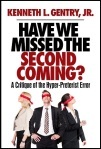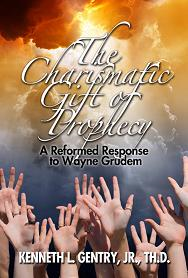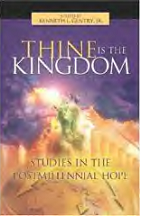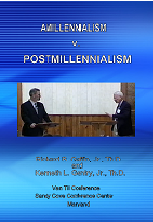INTRODUCING THE TWO WITNESSES (3)
 PMW 2024-068 by Kenneth L. Gentry, Jr.
PMW 2024-068 by Kenneth L. Gentry, Jr.
I am continuing a study begun two issues ago on the two witnesses of Revelation. I will not be dealing with every aspect of their sudden appearance Revelation, but will be defining who they are in the context of the flow of redemptive history.
Not only does Jesus teach that the temple is doomed to destruction but that he is replacing it and its ceremonies in himself. And the early church emphasizes this message by recording it in the Gospels, then publishing, circulating, reading, and preaching it before the destruction of the temple in AD 70, either by means of prominent logia or in one or more of the final Gospels themselves released before that date. Jesus strongly asserts his own authority over the temple (Jn 2:14–17; Mt 21:12–17//) and equates his body with it (Jn 2:19–21). He declares that God now dwells (“tabernacles,” eskēnōsen) in him (Jn 1:14) and that he is “greater than the temple” (Mt 12:6).
He also diminishes the temple’s role in declaring that loving God and neighbor “is much more than all burnt offerings and sacrifices” (Mk 12:22). He authoritatively declares the leper cleansed (Mk 1:40-45), instead of directing him to go to the priests to secure cleansing (Lev 14:2ff). He does not even pay the temple tax, except on the occasion when temple authorities confront him about the matter (Mt 17:24–26). And then he does so only to avoid offense (Mt 17:27). In that context Jesus’ declaration that ‘the sons are free’ thus appears to have provided an unmistakable declaration of independence from the Temple and the attendant political-economic-religious establishment. Against the ceremonial prohibitions he touches the unclean woman, but is not made unclean himself (Mk 5:25–34; cp. Lev 5:2–3) and declares that food does not make one unclean (Mk 7:15; cp. Lev 11:4ff).
Jesus’ testimony against the temple also fits well in Luke’s narrative history in Acts. That work opens with Christ sending “witnesses” to “Jerusalem, and in all Judea” — and to the diaspora Jews (as well as to the Gentiles, Ac 1:8). In Acts Luke prominently presents Stephen as a model witness in Jerusalem (Ac 6:7–8). Most scholars note that Luke intentionally parallels in many respects the story of Stephen with that of Jesus.
In Stephen’s case, the Jews (6:9) charge him before the elders (6:12), Sanhedrin (6:12, 15), and the high priest (7:1) complaining that he “incessantly [ou pauetai] speaks against this holy place, and the Law,” and they blame his preaching on Jesus: “for we have heard him say that this Nazarene, Jesus, will destroy this place and alter the customs which Moses handed down to us” (Ac 6:13-14; cp. 7:48). This is significant in that as a representative of the Jerusalem church, he was teaching that since the death of Jesus, which he considered a crime perpetrated by the temple authorities (v. 52; cf. Ac. 2:23; 4:10; 5:30), the temple not only lost its place and validity in God’s redemptive purpose, but was doomed to destruction.
Have We Missed the Second Coming:
A Critique of the Hyper-preterist Error
by Ken Gentry
This book offers a brief introduction, summary, and critique of Hyper-preterism. Don’t let your church and Christian friends be blindfolded to this new error. To be forewarned is to be forearmed.
For more Christian educational materials: www.KennethGentry.com
Stephen undermines the temple by effectively arguing that the God of Israel is not tied to the land. He shows this by one example after another as God’s revelatory acts occur outside the Land: in Mesopatamia (Ac 7:2), Haran (7:4), Egypt (7:11, 17ff), Shechem (7:16), Midian (7:29), Mount Sinai (7:30), and the wilderness (7:38). Regarding the reaction of the chief priest against Jesus: The teachings and actions of Jesus, especially regarding the Temple, were probably viewed as a challenge to the established order. This is very clear in Jn 11:48 where the Sanhedrin worries: “If we let Him go on like this, all men will believe in Him, and the Romans will come and take away both our place and our nation.”
Luke emphasizes Stephen’s defense by making it the longest recorded discourse in Acts (Ac 7:2–53), one that is given by a man highly esteemed in Israel (6:5, 8, 10, 15; 7:55–56, 60; 8:2). In Luke’s narrative flow, Stephen’s message and martyrdom set the stage for the Jewish persecution of Christianity immediately to follow (7:58–8:1; 22:20). As one scholar notes: “to this point the Church itself had been localized in Jerusalem, impeding progress on the fulfillment of the Great Commission (Acts 1:8). It is only after Stephen’s speech and martyrdom that the Word of God is finally extended beyond Judea.” His message serves as “evidence for early Christian beliefs” (Cole 1950: 33), including their topic of proclamation.
As one scholar puts it: Stephen’s importance to the author of Acts is manifest: the speech credited to him is the longest in a book of speeches; his death precipitates the outward movement of the gospel from Jerusalem (a leitmotiv of Acts); and he is ennobled as the church’s first martyr, one whose death is patterned after the passion of Jesus himself. Indeed, Stephen’s message introduces Acts’ narrative movement away from Jerusalem to the rest of the world, for in Ac 8 the gospel next moves into Samaria. Thus, his sermon — which is his defense against charges relating to his resistance of the temple (6:13–14) — specifically rejects the temple (Ac 7:47–49) and serves as a theological introduction to Luke’s narrative of the Gentile mission. That is, it gives the reason that the church must eventually turn from the Jews to the Gentiles.
To be continued, if the proverbial creek (or even the literal one) does not rise.
Click on the following images for more information on these studies:



Kenneth L. Gentry Jr.'s Blog
- Kenneth L. Gentry Jr.'s profile
- 85 followers



